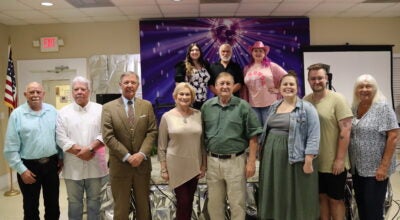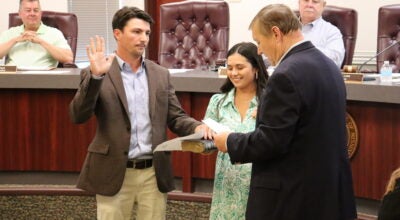USM Group Participating in Inaugural V-Quad Teams Cohort
Published 3:53 pm Wednesday, July 14, 2021
Dr. Partha Sengupta, assistant teaching professor in the School of Computing Sciences and Computer Engineering at The University of Southern Mississippi, (USM) is leading a team of scientists who are part of the Inaugural Cohort of the Mississippi V-Quad Teams – a Mississippi Energy program for Innovation Clusters.
V-Quad’s mission is to build an innovative, virtual incubator network to support Mississippi entrepreneurs and innovators launching businesses focused on energy- and agriculture-related technologies.
This program will help new technology companies seeking to commercialize energy- and agriculture-related technologies find the technical assistance and financial networks that have a specific focus in these areas. States like Mississippi have strong agricultural, energy research and industrial activities that have the potential to spawn innovative technologies with the right entrepreneurial ecosystem in place
The Sengupta team’s project is titled: Ramie fibers for biopolymers and marine-friendly plastics. Sengupta points out that during his postdoctoral research on bio-based products in 2008 at North Dakota State University he learned about a plant named ramie that produces the world’s strongest natural fibers.
“I also found that despite suitable areas of cultivation in the United States, ramie has never been widely cultivated, nor utilized in creative ways in this country,” said Sengupta.
The team’s primary objective is to create a bio-based alternative to synthetic plastics in various avenues of usage.
“Among those would be clothing items, ropes, nets, firehoses, upholstery, ground cover fabrics for erosion control, level II bulletproof panels, and even banknotes,” said Sengupta. “The ramie product would be used as green ocean plastics and biodegradable storage containers, as well as marine usage to preserve flora and fauna.”
Other team members include Dr. Ahmed Sherif, assistant professor in the School of Computing Sciences and Computer Engineering; Dr. Mac Alford, professor in the School of Biological, Environmental, and Earth Sciences, and Dr. Wujian Miao, professor in the School of Mathematics and Natural Sciences.
Sengupta has begun research work on a 3D simulating environment to train drones to monitor plant health and growth. The drone training will subsequently be used in actual drone hardware for precision agriculture. Alford and Miao are working concurrently on procurement of inventory for plant cultivation and downstream processing, while Sherif works on cybersecurity of the autopilot system within the drone.
Ultimately, what Sengupta and his colleagues propose is a new plant cultivation which produces one of the world’s strongest fibers with a growth condition conducive to climatic conditions along the coastal plains of North America. The project involves rapid cultivation of the plant in both Mississippi and adjacent coastal states where luxuriant varieties of the plant can be grown.
“Mississippi already has a rich culture of cotton growth and linen, and we wish to introduce ramie as the third significant crop which has stronger fiber quality, longer fiber length and has more resistance to degradation by insects and mildew than cotton,” said Sengupta.
To learn more about the Mississippi V-Quad Teams, visit: mississippi.org/vquad/




